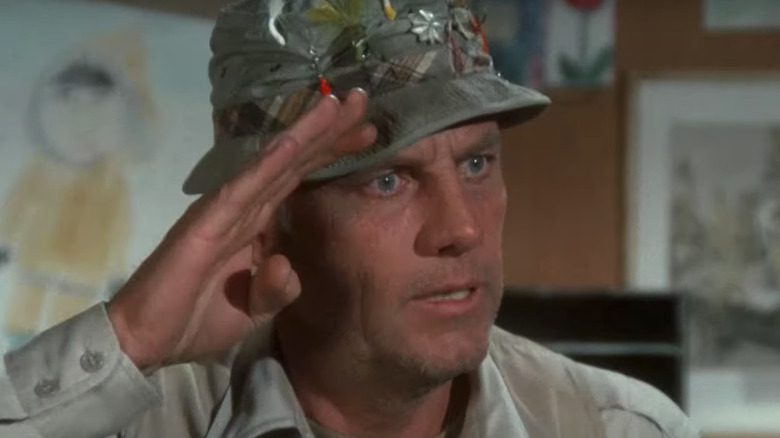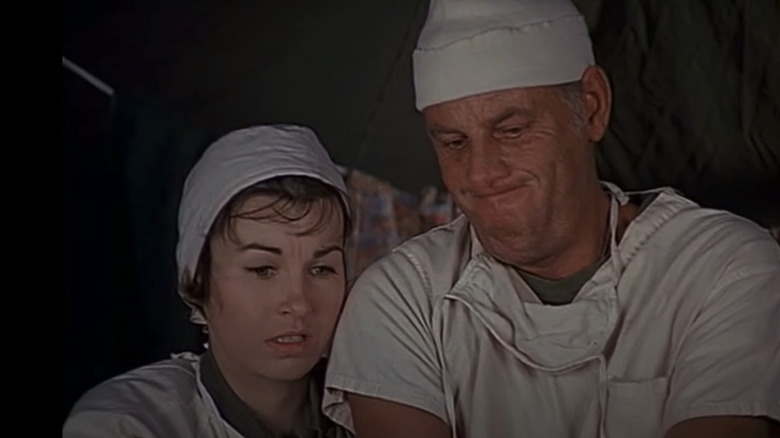The Real Reason McLean Stevenson Left MASH
The CBS comedy-drama "M*A*S*H," set in Korea in an Army mobile surgical hospital during the Korean War, aired from 1972 to 1983. The series stars Alan Alda as Captain Hawkeye Pierce and Loretta Swit as Major Margaret Houlihan, airing on American televisions just as the Vietnam War was winding down (via IMDb). Creator Larry Gelbart said he "wanted to say that war was futile and to represent it as a failure on everybody's part that people had to kill each other to make a point." The audience for the series finale drew 106 million viewers, a record for scripted television that still stands today (via The Washington Post).
The brilliance of the incredibly talented cast – from stars like Jamie Farr and Harry Morgan to guests like Bruno Kirby, Pat Morita, and Teri Garr – carries the show through season upon season of dramatic moments. But for a series that enjoys as much critical and audience acclaim as "M*A*S*H" does, there was a remarkable amount of turnover among the lead actors.
Corporal Radar O'Reilly (Gary Burghoff) goes home to Iowa after seven seasons, Larry Linville's Major Frank Burns is replaced after five seasons, and Captain Trapper John McIntyre (Wayne Rogers) is discharged after Season 3. As Lt. Colonel Henry Blake — the "M*A*S*H" 4077's commanding officer — McLean Stevenson probably seemed irreplaceable. But in Hollywood, there are often unseen reasons why actors leave successful shows, and Stevenson's exit from "M*A*S*H" is no exception.
McLean Stevenson didn't agree with his diminishing role
Many of today's shows feature ensemble casts filled with A-list talent, but in the heyday of "M*A*S*H," most television programs and films drew a clear distinction between their biggest stars and even the most prominent of "supporting" main actors. At the beginning of "M*A*S*H," Alda, Stevenson, and Rogers are written as equally significant characters, sharing the unit's surgical duties and comedic back-and-forth with Linville. But as the series progresses, Alda distinguishes himself as the comedic star of the group, and Hawkeye begins to get noticeably more lines, more laughs, and more camera time.
Stevenson knew that leaving the show might be a mistake, but he made the decision to move on to pursue other projects. As a result, the show wrote him off through a shocking death in the Season 3 finale. Stevenson never achieved "M*A*S*H" levels of success again, and he later confessed that his error was in thinking "everybody in America loved McLean Stevenson. That was not the case. Everybody loved Henry Blake" (via Los Angeles Times).
In his book "Laughing Matters," Gelbart said that "killing a character in a half-hour show had never been done before" (via Us Weekly). Despite opposition from CBS and 20th Century Fox during production, as well as angry fans after the episode aired, Gelbart insisted that "'M*A*S*H' was not about happy endings" and Blake's death was appropriate for the tone of the show (via Academy of American Television). The result is an iconic and memorable scene where Radar comes into a busy operating room to announce that Lt. Colonel Blake's plane has been shot down and there are no survivors. While Stevenson's career did make it through, it was arguably mortally wounded and never fully recovered.

